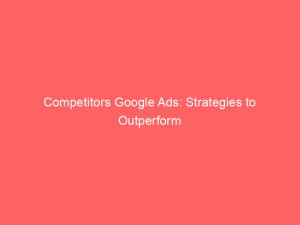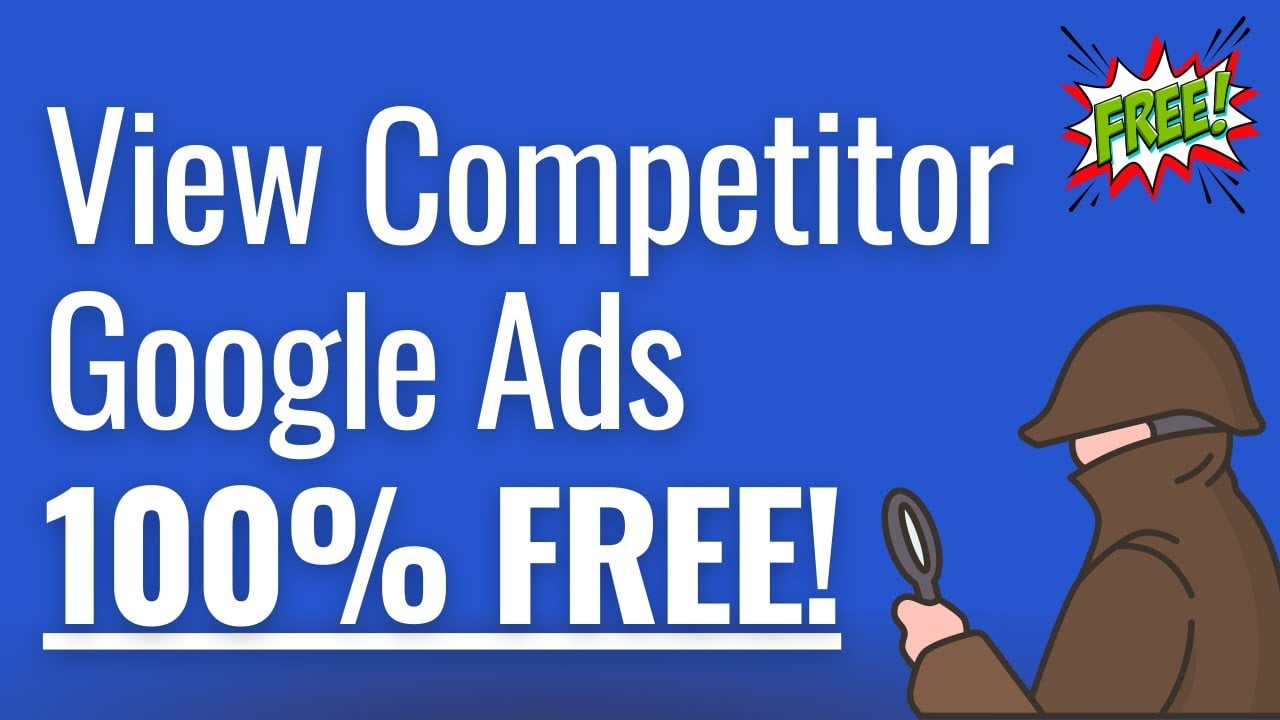- competitors google ads
- Paid Advertisements And Increased E-Commerce Traffic
- Types Of Campaigns Offered By Google Ads
- Rising Cost-Per-Click On Google Because Of Competition
- Complexity And Optimization Of Google Ads
- Cost-Effective And User-Friendly Alternative Advertising Platforms
- Consideration For Audience And Target Audience On Different Platforms
- Different Structures And Better Suitability For Certain Businesses
- Alternative Advertising Options To Google Ads
In the digital landscape, where attention is scarce and competition is fierce, businesses are constantly on the lookout for the most effective ways to reach their target audience. Enter GoogleAds, a behemoth in the realm of online advertising.
With its vast reach and powerful targeting options, it has long been hailed as the go-to platform for advertisers. However, in this ever-evolving industry, new contenders are emerging, challenging Google’s dominance.
Facebook Ads and Amazon Advertising have been making waves, offering cost-effective and user-friendly alternatives. Are these competitors capable of dethroning the advertising giant?
In this article, we will delve into the world of online advertising and explore the potential of these platforms to revolutionize the game.
| Item | Details |
|---|---|
| Topic | Competitors Google Ads: Strategies to Outperform the Giants |
| Category | Ads |
| Key takeaway | In the digital landscape, where attention is scarce and competition is fierce, businesses are constantly on the lookout for the most effective ways to reach their target audience. |
| Last updated | December 28, 2025 |
ads">competitors google ads
Competitors to Google Ads include Microsoft Advertising, Amazon Advertising, LinkedIn Ads, Facebook Ads, Instagram Advertising, Instagram Explore, Reddit Ads, and Infolinks. These alternative advertising platforms cater to various types of businesses and target audiences.
Microsoft Advertising, also known as Bing Ads, provides an alternative to Google Ads with a different user base. Amazon Advertising is a suitable option for e-commerce businesses that sell on Amazon.
LinkedIn Ads is beneficial for SaaS and B2B businesses. Facebook Ads boasts a wide user base and advanced algorithm.
Instagram Advertising is ideal for businesses targeting a younger audience. Other platforms to consider include Instagram Explore, Reddit Ads, and Infolinks.
When comparing Google Ads to these alternatives, it is essential to evaluate their effectiveness and cost in reaching the desired target audience.Key Points:
- Competitors to Google Ads include:
- Microsoft Advertising
- Amazon Advertising
- LinkedIn Ads
- Facebook Ads
- Instagram Advertising
- Reddit Ads
- Microsoft Advertising, also known as Bing Ads, targets a different user base than Google Ads.
- Amazon Advertising is suitable for e-commerce businesses selling on Amazon.
- LinkedIn Ads is beneficial for SaaS and B2B businesses.
- Facebook Ads has a wide user base and advanced algorithm.
- Instagram Advertising and Reddit Ads are ideal for businesses targeting specific audiences.
Sources
https://www.g2.com/products/google-ads/competitors/alternatives
https://sixads.net/alternatives/google-ads/
https://www.trustradius.com/products/google-ads/competitors
https://joinative.com/best-google-ads-alternatives
Check this out:
💡 Pro Tips:
1. Look beyond Google Ads: While Google Ads is a popular platform, don’t limit yourself to just one advertising channel. Explore alternative platforms like Microsoft Advertising, Amazon Advertising, LinkedIn Ads, Facebook Ads, Instagram Advertising, Reddit Ads, and Infolinks to find the best fit for your business.
2. Consider different target audiences: Each advertising platform attracts a slightly different user base. When evaluating alternatives to Google Ads, consider the demographics and interests of the platform’s users. This will help you reach your target audience more effectively.
3. Evaluate the cost-effectiveness: Although Google Ads is widely used, it may not always be the most cost-effective option. Compare the effectiveness and cost of Google Ads with alternative platforms to determine where your advertising budget will generate the best results.
4. Tailor your campaign to the platform: Different platforms have unique structures and features. Optimize your advertising campaigns specifically for each platform to maximize their effectiveness. For example, LinkedIn Ads may be more suitable for SaaS and B2B businesses, while Instagram Advertising could be ideal for businesses targeting a younger audience.
5. Experiment and analyze: In order to find the most efficient advertising strategy, it’s essential to experiment with different platforms and analyze the results. Monitor key metrics such as click-through rates, conversion rates, and return on ad spend to identify which platforms are delivering the highest return on investment.
Paid Advertisements And Increased E-Commerce Traffic
Paid advertisements play a vital role in driving traffic to e-commerce stores. Among the various online advertising platforms, Google Ads has emerged as a popular choice for businesses looking to boost their online presence.
With Google Ads, businesses have the opportunity to showcase their products and services to a wide audience and attract potential customers. By leveraging the power of paid ads, e-commerce stores can significantly increase their website traffic, leading to higher sales and conversions.
Types Of Campaigns Offered By Google Ads
Google Ads offers a range of campaign types to suit different advertising goals. These include Search campaigns, Display campaigns, Video campaigns, Shopping campaigns, and App campaigns.
Each campaign type caters to specific objectives and targets audiences through different channels. For instance, Search campaigns focus on displaying ads within Google search results, while Display campaigns showcase ads on partner websites.
Video campaigns allow businesses to create engaging video content, and Shopping campaigns are ideal for e-commerce businesses looking to promote their products. App campaigns, on the other hand, target app users across various platforms.
Rising Cost-Per-Click On Google Because Of Competition
Competition on Google has significantly increased over the years, leading to a rise in the cost-per-click (CPC). As more businesses compete for ad space on Google, the bidding process becomes more competitive, driving up the costs.
This situation poses a challenge for businesses looking to advertise on Google Ads, as it can impact their advertising budget and ROI. However, with strategic planning and optimization, businesses can still achieve their advertising goals on the platform.
It is crucial to target niche keywords, create compelling ad copies, and continuously monitor and adjust campaigns to maximize their performance.
Complexity And Optimization Of Google Ads
While Google Ads offers a powerful platform for online advertising, it can also be complex and require both time and money to optimize. Managing campaigns on Google Ads involves various factors, including keyword research, ad creation, bid management, and performance tracking.
It requires a deep understanding of the platform’s functionalities and expertise in implementing effective strategies. To fully leverage the potential of Google Ads, businesses often need the assistance of digital marketing professionals or agencies who specialize in Google Ads management and optimization.
Cost-Effective And User-Friendly Alternative Advertising Platforms
Although Google Ads is a popular choice, there are alternative advertising platforms that can be more cost-effective and user-friendly for businesses. These platforms offer unique features and target specific audiences, making them suitable for different business types and industries.
One such alternative is Microsoft Advertising, formerly known as Bing Ads. It provides an alternative search engine advertising platform that can reach a different user base from Google.
For e-commerce businesses operating on Amazon, Amazon Advertising is an excellent choice, enabling businesses to promote their products directly on the Amazon marketplace. LinkedIn Ads caters to SaaS and B2B businesses, offering targeted advertising options to reach a professional audience.
Facebook Ads, with its wide user base and advanced algorithm, is suitable for businesses looking to target a diverse audience. Instagram Advertising, on the other hand, is ideal for businesses targeting a younger demographic and visually appealing content.
Fresh tips added for marketers this week.
Other advertising platforms to consider include Instagram Explore, Reddit Ads, and Infolinks, each serving unique purposes and targeting specific audiences. It is essential to evaluate the effectiveness and cost of these alternative platforms compared to Google Ads, considering factors such as reach, engagement, conversion rates, and overall return on investment.
Consideration For Audience And Target Audience On Different Platforms
When choosing between advertising platforms, it is essential to consider the audience and target audience that the platform can reach. Each platform attracts a distinct user base with specific demographics, interests, and browsing behavior.
Understanding the characteristics of the target audience and aligning them with the platform’s user base is crucial for successful ad campaigns. Through careful research and analysis, businesses can identify the platforms that offer the greatest potential to connect with their target audience and drive meaningful engagement.
Different Structures And Better Suitability For Certain Businesses
Apart from audience considerations, different advertising platforms have distinct structures that may suit certain businesses better than others. For instance, Google Ads predominantly relies on search queries and keywords, making it suitable for businesses with a strong focus on search engine marketing.
On the other hand, platforms like Instagram and Facebook provide a more visually-oriented experience, making them ideal for businesses with visually appealing products or services. Understanding the strengths and limitations of each platform’s structure allows businesses to align their advertising strategies to maximize their impact and reach the desired audience effectively.
Alternative Advertising Options To Google Ads
In addition to the alternative advertising platforms mentioned above, there are other options worth exploring. Instagram Explore offers the opportunity to showcase ads to users while they are browsing content related to their interests, allowing businesses to reach a highly engaged audience.
Reddit Ads, on the other hand, provide the ability to target specific subreddits based on niche interests or communities. Infolinks is a native advertising platform that allows businesses to display ads in a non-intrusive manner within the content of a website.
These alternative options provide businesses with additional avenues to diversify their advertising efforts and cater to specific business objectives and target audiences. By exploring these options, businesses can develop a comprehensive advertising strategy that extends beyond the dominance of Google Ads and potentially deliver successful results.
Buy Traffic • Programmatic Advertising • Advertising Platform for Marketers











